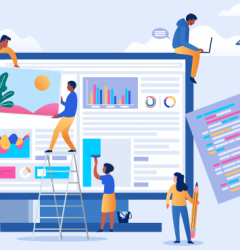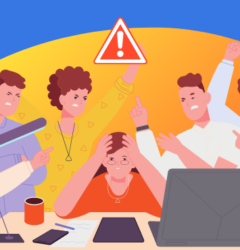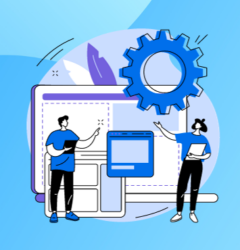
With shifting trends and technological advancements, it’s not just private organizations that need to transform digitally and innovate how they operate. Governments are the key facilitators, and the No-code helps governments to participate in all socio-economic activities. They, too, need to upgrade and automate their internal processes, integrate with other departments, and offer services to citizens over digital platforms.
Unfortunately, these PSUs use old software that has not been updated or changed since their implementation. On the other hand, the private sector is every day competing to keep up with the technology game. Once the government sector falls behind, replacing the legacy system will become exponentially expensive.
The global citizen is going digital but still observes many government units struggling with basic processes like application form processing, handling service requests, and providing basic policy information to citizens! This is resulting in a widening gap between citizens and departments in terms of technological growth and transformation.
According to Statistica, the annual number of app downloads worldwide will amount to 299 billion up from 247 in 2020. Government departments must leverage this trend and be more digitally integrated to serve citizens well.
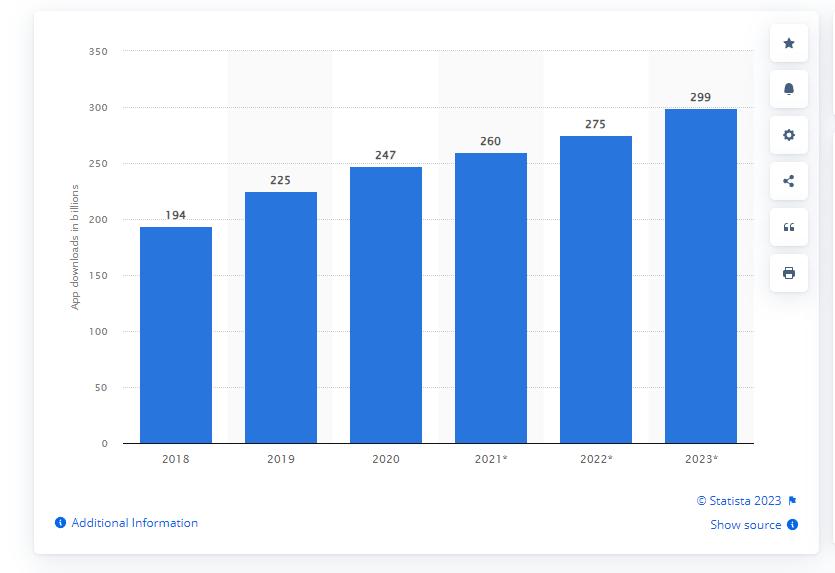
Key considerations of PSUs while selecting a platform
Scalability
Every day, government organizations deal with n number of applications and requests to process. It is imperative for the PSUs to process these requests on time. Plus, regulations are changing daily, and government organizations must keep up with these changes and incorporate them into their everyday processes.
Security
PSUs daily deal with sensitive citizen information, so government organizations must keep rigorous security requirements. It is of high priority for them to avoid any risk that threatens data protection.
Performance
Handling large amounts of data and keeping up with the security requirements of citizen data are prerequisites of IT software that government organizations or PSUs should use. But, along with mentioned elements, it is of equal importance that the software should have high computation capabilities. As mentioned in the above example, receiving hundreds of applications for driving licenses and being unable to serve them time will only create more burden and discomfort for PSUs and citizens.
Take an Example
In a developing country like India, if a person wants to file a request for a driving license, the steps involved are:
- Going to the RTO office to fill out the application form and bringing documents as proof in the next visit only to be stored in files, increasing the waiting time.
- Now, even after all the hassle, only a few applications are processed during the day of the test because police verification requires stamps, approvals, and signatures.
- The line is endless and the entire day is taken up for just a 20-minute test.
How can all of this hassle be avoided for the citizen and how can the processing of applications be faster and more efficient?
Here’s where No-Code helps Governments
Government agencies like RTO departments involve complex processes that are constantly evolving because of changes in rules and regulations. Incorporating the same changes in traditional software development sometimes takes months and n number of follow-ups.
No-code helps governments by offering solutions that are not only easy to use but built too! These platforms provide a drag-and-drop visual interface that departments can use to automate processes and build applications. This can be done without writing any code or with assistance from professional developers.
In comparison with traditional software development, no-code development enables business users to build applications in hours and days rather than months and weeks.
- In the above example, RTO offices can build application that will automate the whole process without having to wait for software developers to built it and writing any code.
- No-code not only helps in getting the process functionality set up in no time, but changes can also be done with a click of few buttons; without having to compromise on security of the data.
- The customization capability of no-code platform enables users to scale operations easily.
- Processing hundreds of applications instead of just a few and just coming for the driving test on the day of the test, allowing more applicants to appear.

Government operations that can be automated with No-Code App Development
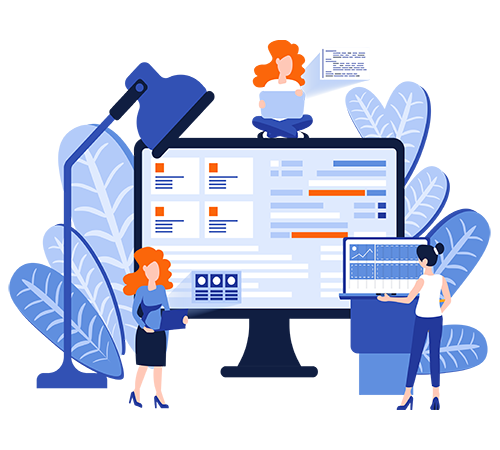
Let us look at different government operations that can be automated with the help of no-code app development. From Infrastructure to Healthcare, no-code apps can transform how departments function and enhance public life.
Also read: Everything you should know about No-Code Development
For Internal Officials and Executives
By setting up configurable Command and Control Dashboards, executives can gain actionable insights into data from various applications for informed, instant responses and effective decision making. They can leverage advanced charting and reporting tools for in-depth analysis. For example, detailed reporting and analyzing disease outbreaks, pest-attacks, crime and accident reports, etc.
Compliance Management Apps ensure that mandated requirements crucial for government units are fulfilled. No-code apps help build and maintain checklists to capture compliance data using any device from anywhere and access it in real-time from the central server.
Project Management Apps help manage projects e.g laying roads, building reservoirs, etc. effectively and efficiently by automating different project activities through workflows. These apps help get the real-time status of project tasks based on data entered by the field staff from anywhere using any device.
Build Field Operations and Infrastructure Apps to reduce costs and efficiencies related to manual data collection for on-field activities followed by data entry into IT systems. This enables field staff to collect service or inspection data using any device that can become available on the central server in real-time. For example government services like health drives, government surveys, utility usage recording, job reports, etc.
Streamline Transport Operations and Data with apps that provide a consolidated state-wide transport database with real-time updates and availability. All public transport data, quality inspections, reports, vehicle records, and documents could exist on one platform, easy to access and compare as well.
For Citizen Service
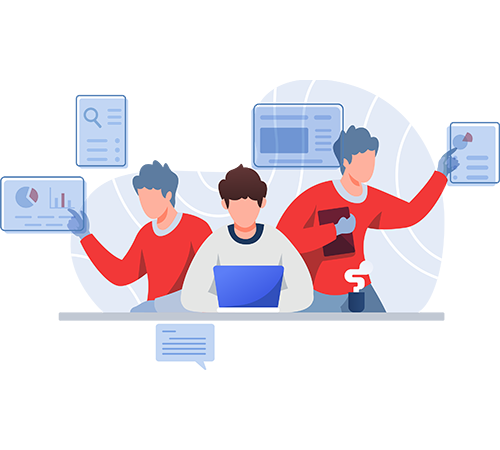
Citizen Portals and Self-service Apps help in delivering an engaging citizen experience through online citizen portals that are accessible from anywhere using any device. Citizens can request services or check the status of their existing requests in real-time.
Deploy Public Safety Apps to effectively manage critical incident response, inspection, assurance, community engagement, etc. Reduce costs and boost efficiency by real-time data inputs and reports to analyze risks and strong areas.
Enhance Education and Learning by developing apps that integrate classrooms, update syllabus, office processes with personnel management, student records, asset tracking, scheduling, and enrollment, all built to fit your needs.
Citizen Feedback Apps help city-wide easy collection of data from residents about improvements and suggestions. The system displays a concise view of data from any device and provides relevant insights.
Utility Management Apps can provide service updates, request/disconnect services, complaint management, meter readings, bill payments, etc. and also have an FAQ portal to answer questions regarding procedures, instructions, and additional information.
Non-functional needs critical to government and PSUs
Scalability
Every day, government organizations deal with n number of applications and requests to process. It is imperative for the PSUs to process these requests on time. Plus, regulations are changing every day, and government organizations need to keep up with these changes and incorporate them into their everyday processes.
Security
PSUs every day deal with sensitive citizen information, which is why government organizations must keep rigorous security requirements. It is of high priority for them to avoid any risk threatening data protection.
Performance
Handling large amounts of data and keeping up with the security requirements of citizen data are prerequisites of IT software that government organizations or PSUs should use. But, along with the mentioned elements, it is equally important that the software should have high computation capabilities. As mentioned in the above example, receiving hundreds of applications for driving licenses and not being able to serve them time will only create more burden and discomfort for PSUs as well as citizens.
Why Do Governments Need No-Code?
We have seen solutions that departments can leverage. Now let’s look at how can no-code help governments and accelerate growth to bring digital transformation.
- Boost Efficiency and Productivity: No-code enhances work quality and boosts productivity through automated workflows configured with notifications, reminders, and escalations at each step. Dashboards provide real-time insights into staff utilization and performance.
- Ensure transparency and accountability: Once you adopt no-code apps and use them for your departments, it will ensure accountability. All communication and information can be digitally recorded and traced. All data will be stored in real time and can be accessed through any device!
- Slashed Time and Costs: Government agencies need a high productivity platform that reduces costs and delivers new solutions with speed and agility. No-code will help you build and deploy applications within weeks and costs less than traditional systems, which is what governments need!
- Increased Agility: No-code development provides flexibility to upgrade applications as and when there are changes in policies and procedures. All with just a few clicks.
- Scalability: No-code platforms transfer the ability to create applications into the hands of business users. These platforms leverage cloud capabilities that enable users to scale their operations whenever needed.
- Security: Advanced no-code platforms understand the need for highly secure data. Certification such as ISO 20071:2013 and SOC 2 Type 2 ensure their commitment towards enterprise-grade data security.
- Streamline Communication and Collaboration: Government apps streamline communication and use automation to optimize processes so that the officials across departments are notified about their tasks, ongoing projects, etc., through automated workflows.
- Make Citizens Happy: Once all operations are made digital and automated, citizens would experience effective and enhanced delivery of services and be able to perform tedious functions to avoid frustration.
Also read: The Future of Software is No Code and Low Code Programming
Quixy: The Perfect No-Code Platform for Government Departments
All solutions discussed in the article can be built and deployed on Quixy, a leading advanced no-code platform. No code helps governments in automating all of the above and many more operations. The platform ensures that all data remains secure and confidential. Even if data exists on other applications, Quixy can easily integrate and streamline with them.
As mentioned, no-code apps can be built by anyone! We offer the benefit of any government official to build and deploy an app. You don’t need any technical experience or knowledge about code. Anyone (or as we like calling them, citizen developers) can build functional applications at least 10 times faster than other approaches.
Ready to transform your business? Get started now and experience the power of automation and app creation, all without the need for coding skills.
Frequently Asked Questions(FAQ)
What is low-code no-code in government?
Low-code no-code in government refers to using low-code and no-code development platforms to streamline and automate various processes and services within government agencies. These platforms allow for more efficient and agile development of digital solutions without extensive coding.
What is low-code movement?
The low-code movement is a trend in software development that emphasizes using low-code platforms to accelerate application development. It simplifies the coding process, making it more accessible to a wider range of users, including those with limited coding experience.
What is the concept of no-code?
The concept of no-code involves creating software, automating processes, and building applications without writing traditional code. It uses visual tools and pre-built components to design and configure solutions, making development accessible to non-developers.
What is no-code low-code revolution?
The no-code low-code revolution signifies a shift in how software is developed and automation is achieved. It represents a move toward more user-friendly and efficient development methods that empower non-developers to participate in creating digital solutions, transforming how businesses and organizations operate.
How will no-code help in government?
No-code will help government by simplifying and accelerating the development of digital solutions, making government processes more efficient and accessible to a wider range of users.
Login
Please login to comment
0 Comments
Oldest
